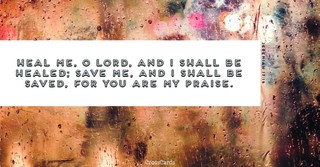
- Recent Translations
- All Translations
Jeremiah 17:21
Share
Settings
Jeremiah 17:21 Meaning and Commentary
Thus saith the Lord, take heed to yourselves
That ye sin not against the Lord, by breaking the sabbath, and so bring wrath and ruin upon yourselves: or "to your souls" F1; to the inward frame of them, that they be in disposition for the work of that day; and that they be wholly engaged therein, even all the powers and faculties of them; and that they be not taken up in thoughts and cares about other things: and bear no burden on the sabbath day;
as no worldly thoughts and cares should, cumber the mind, and lie heavy thereon, to the interruption of spiritual exercises of religion; so neither should any weight or burden be borne by the body, or carried from place to place; as not by themselves, so neither by their servants, nor by their cattle, nor in carts and wagons, nor by any instrument whatever; in short, all servile work was forbidden: nor bring [it] in by the gates of Jerusalem;
to be unloaded and sold there, as wine, grapes, figs, and fish, were, in the times of Nehemiah, ( Nehemiah 13:15 Nehemiah 13:16 Nehemiah 13:19 ) .
F1 (Mkytwvpnb) "in animabus vestris", Calvin, Montanus, Schmidt.

